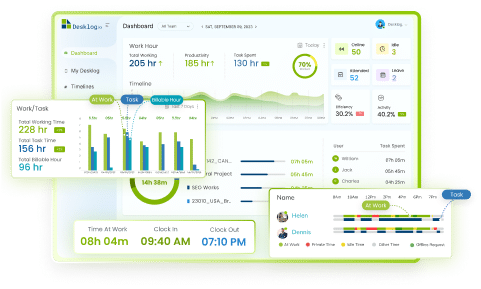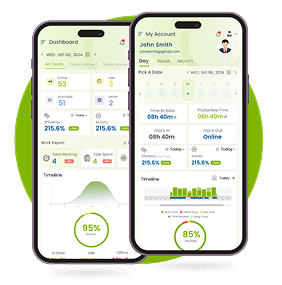
Best Toggl Alternatives For Time Tracking
Toggl Track has long been a go-to for simple, effective time tracking. But as workflows grow more complex, many users find themselves needing more than just basic timers.
While Toggl Track is great for logging hours, there’s a rising demand for time tracking software that combines time tracking with built-in project management, automated analytics, and team collaboration without relying on multiple third-party apps.
Whether you’re coordinating remote teams, managing billable hours or looking to improve productivity, it’s worth exploring top Toggl alternatives that better suit your team and your workflows.
In this blog, we’ll cover:
What is Toggl Track?
Toggl Track Strengths and Limitations:
10 Best Toggl Alternatives for 2025
What is Toggl Track?
Toggl Track is a popular time-tracking tool designed to help individuals and teams track how time is spent across tasks and projects. It offers features like manual and automatic time logging, cross-device synchronization, offline tracking, and integrations with over 100 third-party apps. With a clean interface and flexible reporting tools, it caters well to freelancers and small teams who need simple yet insightful time management.
However, while Toggl Track shines in core time-tracking, it falls short in areas critical such as GPS tracking, shift scheduling, payroll processing, and real-time mobile management, making it less suitable for field teams, larger organizations, or businesses requiring full workforce automation.
If your workflow depends heavily on field operations, automated workflows, or deeper project and team management, you may want to explore Toggl alternatives that offer those features more natively.
Toggl Track Strengths and Limitations:
| ✓ Strengths | ✗ Limitations |
|---|---|
| Intuitive time tracking | No GPS or field support |
| Excellent reporting & analytics | Manual time entry & timesheet workflows |
| Broad integrations | No scheduling, payroll, or robust invoicing |
| Cross‑platform & offline | Sync issues and notification fatigue |
| Scalable pricing tiers | High cost for team usage |
| Beautiful UI & project dashboards | Weak project/task depth and reporting detail |
10 Best Toggl Alternatives for 2025
1. Desklog
Desklog is an intuitive time tracking and employee productivity tool designed to improve team efficiency, productivity and focus. It offers features like automated time tracking, project time tracking, project billing, activity tracking, and detailed reporting.
With integrations to platforms like Jira and ClickUp, Desklog supports both remote and in-office teams, providing insights into app usage, website visits, and idle time to help managers identify productivity bottlenecks and implement improvements.
Key Features
Automated Time Tracking : Tracks time spent on tasks and applications without manual input.
Project Time Tracking : Track time spent on specific projects for accurate billing.
Automated Timesheets : Generates timesheets automatically for accurate payroll processing.
Idle Time Detection : Identifies periods of inactivity to assess productivity.
App & URL Tracking : Tracks application and website usage to evaluate work habits.
Shift & Leave Management : Manages employee schedules and leave requests.
Kanban View : Visualizes tasks and workflows for better project management.
Screenshots (Optional) : Captures screenshots at set intervals to track employee activity.
Integrations : Connects with tools like Jira, ClickUp, Asana, etc.
Mobile & Offline Tracking : Supports time tracking on mobile devices and offline modes.
Pros & Cons
Pros:
User-Friendly Interface
Complete Time Tracking
Advanced Reporting
Smooth Integrations
Effective for Remote, Hybrid and Field Teams
Cons:
No Chrome Extension
Pricing
Free : $0/month
Business : $3.50/user/month
Enterprise : $4.80/user/month
Ratings
G2 : 4.8/5
Capterra : 4.8/5
2. Clockify

As a Toggl alternative, Clockify offers a powerful and flexible time-tracking solution for both individuals and teams. It allows users to track hours through timers or manual entries across web, desktop, mobile apps, and browser extensions with the added benefit of unlimited users and projects even on the free plan.
Clockify stands out with built-in features like idle detection, Pomodoro timers, and reporting tools, making it especially appealing to freelancers, small teams, and businesses looking for a cost-effective way to manage productivity without sacrificing functionality.
Key Features
Time Tracking
Reporting & Dashboard
Integrations
Management & Planning
Admin & Security
Cross-Platform Access
Pros & Cons
Pros
Generous Free Plan
User-Friendly & Accessible
Extensive Integrations
Cons
Mobile App Issues
Manual Time Management Required
Free Plan Limitations
Pricing
Free : $0
Basic : $4.99/user/month
Standard : $6.99/user/month
Pro : $9.99/user/month
Enterprise : $14.99 /user/month
Cake Bundle : $15.99 /user/month
User Ratings
G2 : 4.5/5
Capterra : 4.8/5
3. Timely
Timely is an AI-driven time-tracking solution that goes beyond manual timers. Unlike Toggl, it automatically captures activity across apps, websites, and documents using its unique “Memory Tracker.” This eliminates the need for manual entry while ensuring complete and accurate time logs.
Users can easily organize tracked time into projects and tasks, generate detailed timesheets, monitor budgets and billing, and access real-time insights through team dashboards and reports. With over 100 app integrations and strong privacy-first design Timely is ideal for both individuals and teams looking for an intelligent alternative to Toggl.
Key Features
Automatic Time Tracking & Memory Recorder
AI‑Generated Timesheets
Project & Task Management
Team Visibility & Capacity Insights
Reporting & Invoicing
Pros & Cons
Pros
Clear & Intuitive UI
Strong Project Oversight
Respect for User Privacy
Cons
Higher Price Point
Occasional AI Misfires
No Free Tier
Pricing:
Starter : $11/user/month
Premium: $20 /user/month
Unlimited: $28 /user/month
Ratings
G2 : 4.8/5
Capterra : 4.7/5
4. ClickUp

ClickUp is a powerful all-in-one productivity platform that offers time tracking alongside robust project management tools, making it a compelling alternative to Toggl. While Toggl focuses primarily on tracking time, ClickUp combines time tracking with task management, document collaboration, team communication, dashboards, automations and even AI features.
Its highly customizable interface allows users to customize views, workflows, and custom fields to fit any workflow. ClickUp also supports native time tracking, manual time entries, and third-party integrations, providing flexibility for both individuals and teams. Plus, with a generous free plan, it’s easy to get started and scale as your needs grow.
Key Features
Flexible Task & Project Views
Customizable Workflows
Built‑in Collaboration Tools
Automation & AI (ClickUp Brain)
Native Time Tracking & Estimates
Dashboards & Reporting
Rich Integration Ecosystem
Pros & Cons
Pros
Generous Free Plan
Powerful Automations
Built‑in Collaboration Tools
Cons
Performance Issues
Mobile App Limitations
Overwhelming UI for Simpler Needs
Pricing Complexity & Plan Changes
Pricing
Free Forever : $0
Unlimited : $10/month/user
Business : $19/month/user
Enterprise : Custom pricing
Ratings
G2 : 4.7/5
Capterra : 4.6/5
5. RescueTime

RescueTime is an automatic time-tracking and productivity tool designed for individuals and small teams who want insights without manual input. Unlike Toggl, which relies on manual timers, RescueTime runs in the background across devices, tracking web, app and document usage effortlessly.
It helps users build better habits with features like distraction-blocking Focus Sessions , real-time alerts, goal tracking, timesheets and detailed weekly reports. With its data-based approach, RescueTime is ideal for those seeking a low-maintenance, insight-rich alternative to Toggl that emphasizes focus and productivity over micromanagement.
Key Features
Automatic Time Tracking
Detailed Reports & Insights
Goal Setting & Alerts
Focus Sessions
Timesheets & Offline Tracking
Pros & Cons
Pros
Detailed Reports & Summaries
Free Basic Plan Available
Works on All Major Platforms
Cons
Complex UI and reports
Glitchy mobile app
Some privacy concerns
Pricing
Lite (Free) : $0
Premium : $12/user/ month
Team Plan : $9/user/month
Ratings
G2 : 4.2/5
Capterra : 4.6/5
6. Hubstaff

Hubstaff goes beyond simple time tracking by offering a full workforce management suite tailored for remote and distributed teams. Unlike Toggl, it features automatic time tracking across desktop, mobile, and GPS, plus advanced tools like activity monitoring, screenshots, scheduling, payroll, invoicing, and project budgeting.
What sets Hubstaff apart is its balance between oversight and privacy, with options like blurred screenshots and no keystroke logging. For teams needing deeper visibility and integrated management tools, Hubstaff offers a robust alternative to Toggl’s lightweight approach.
Key Features
Time Tracking & Timesheets
Productivity Monitoring
GPS & Geofencing
Invoicing & Payroll
Scheduling & Attendance
Pros & Cons
Pros
Free Tier With Basic Tracking
Privacy-Conscious Monitoring
Includes GPS, Payroll, Invoicing, etc.
Cons
Some Find Monitoring Intrusive
Complex UI For New Users
Pricing
Starter : ~$7/user/month
Grow : ~$9/user/month
Team : ~$12/user/month
Enterprise : $25/user/month
Ratings
G2 : 4.5/5
Capterra : 4.6/5
7. Harvest

Harvest is a cloud-based time tracking solution ideal for freelancers, small businesses, and teams offering everything Toggl does, plus built-in invoicing and expense tracking. Users can log time via intuitive timers or manual entries across web, desktop, and mobile.
Beyond time tracking, Harvest lets you track project budgets, manage expenses, and generate professional invoices. With robust reporting and seamless integrations with tools like QuickBooks, Slack, PayPal, and Stripe, Harvest is a strong Toggl alternative for those needing an all-in-one solution from time logging to payment.
Key Features
Time & Expense Tracking
Invoicing & Payments
Reporting & Analysis
Team & Project Management
Integrations
Pros & Cons
Pros
Easy Time Tracking & Visual Reports
Strong Integrations
Mobile Apps for IOS and Android
Cons
Paid plans can be costly for teams
Occasional sync issues and interface bugs
Free plan limited to 1 user
Pricing
Free Plan : $0
Pro : $13.75/user/month
Premium : $17.50 /user/month
Ratings
G2 : 4.3 / 5
Capterra : 4.6/5
8. TimeCamp

TimeCamp is a flexible time-tracking tool designed for individuals and teams looking for more automation and functionality than Toggl offers. It features automatic background tracking, detailed reports, project budgeting, attendance tracking, and built-in invoicing, making it ideal for freelancers, agencies, and remote teams.
Available on desktop, mobile, and web, TimeCamp simplifies task tracking, billing, and productivity monitoring, offering an all-in-one alternative to Toggl’s more manual approach.
Key Features
Automatic Time Tracking
Project & Task Tracking
Invoicing & Billing
Reporting & Analytics
Attendance & Approvals
Pros & Cons
Pros
Built-In Billing and Invoicing
Affordable Paid Tiers
Detailed Reporting and Attendance Tracking
Cons
Mobile App and Offline Tracking Can Be Unreliable
Limited Task Management
Occasional Sync and Performance Issues
Pricing
Free: $0
Starter : $1.99/user/month
Premium: $3.99/user/month
Ultimate: $5.99/user/month
Enterprise : $14.99/user/month
Ratings
G2 : 4.7/5
Capterra : 4.7/5
9. DeskTime

DeskTime is an automatic time-tracking tool built for teams and businesses that need deeper visibility into daily workflows. Unlike Toggl’s manual tracking, DeskTime captures real-time data on app, website, and task usage, offering instant productivity insights.
With built-in Pomodoro timers, shift scheduling, and project billing, it’s ideal for remote teams, freelancers, and organizations looking to improve time management and team accountability. For those wanting both tracking and employee oversight in one tool, DeskTime is a powerful Toggl alternative.
Key Features
Automatic Time Tracking
Pomodoro Timer
Shift Scheduling
Project & Task Tracking
Mobile & Offline Tracking
Pros & Cons
Pros
User-Friendly and Easy to Navigate
Detailed Reporting
Integrates With Popular Third-Party Tools
Cons
Limited Customization Options
Advanced Features Locked Behind Higher-Tier Plans
Risk Of Micromanagement
Pricing
Pro : $5/user/month
Premium : $7/user/month
Enterprise : Custom
Ratings
G2 : 4.5/5
Capterra : 4.5/5
10. Time Doctor

Time Doctor is a powerful time tracking solution for teams and businesses needing more than just timers. Unlike Toggl’s lightweight approach, Time Doctor offers automatic tracking, screenshot monitoring, task management, and detailed productivity reports to ensure accountability and optimize workflows.
With support for remote teams, freelancers, and enterprises, it also integrates with 60+ tools like Slack, Jira, and QuickBooks. For those looking for time tracking with built-in oversight and payroll capabilities, Time Doctor is a complete Toggl alternative.
Key Features
Automatic Time Tracking
Project & Task Management
Detailed Reporting
Payroll Integration
Pros & Cons
Pros
Time tracking with detailed insights
Advanced reporting for better accountability
Integrates with 60+ popular applications
Cons
Mobile app has limited features and performance issues
Pricing may be high for smaller teams
Some users report slow customer support
Pricing
Basic : $8/user/month
Standard : $14/user/month
Premium : $20/user/month
Enterprise : Custom pricing
Ratings
G2 : 4.4/5
Capterra : 4.5/5



